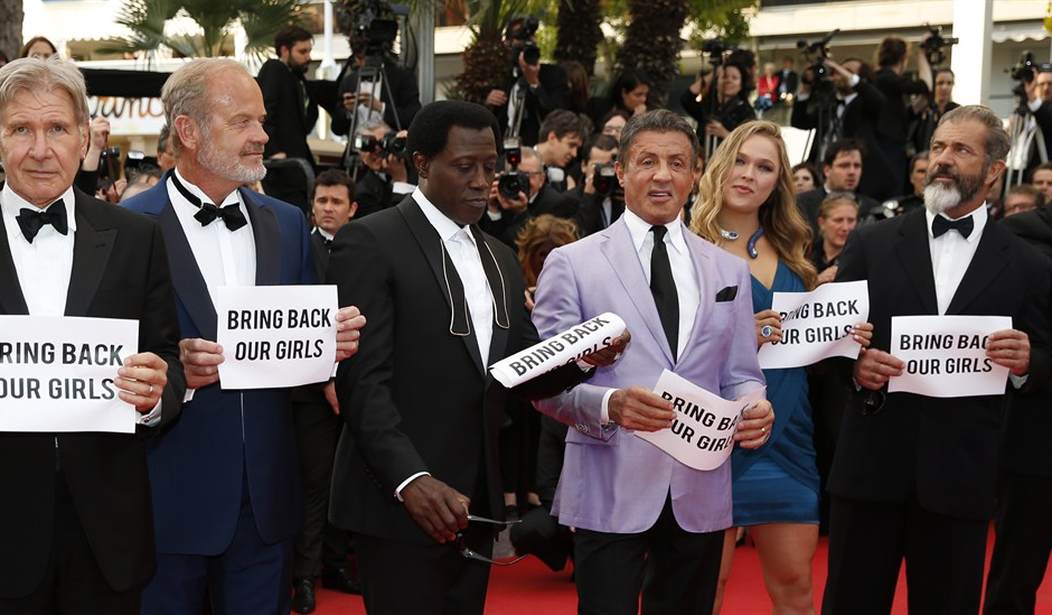I’m not among those who object to the Twitter campaign focusing on the kidnapping and enslaving of hundreds of Nigerian school girls. As syndicated columnist, Charles Krauthammer has pointed out, hashtagging one’s outrage is “just the cyber equivalent of the mass petition,” a way to draw the attention of governments and the major media which, as I’ve pointed out, have tended to give short shrift to the spread of Islamism in Africa.
I do have a question about the hashtag itself: #BringBackOurGirls. But before we get to that, a little background on how the phrase went global may be helpful. According to reporter Brian Ries, it was Oby Ezekwesil, a vice president of the World Bank for Africa, who first publicly demanded “Bring back the girls!” at an unrelated event in the Nigerian city of Port Harcourt on April 23rd. Two men in the audience tweeted her remarks using #BringBackOurGirls. Later in the day, Ms. Ezekwesil did too.
The phrase “hummed along until April 30 when news broke that hundreds of the girls would likely be shared with Islamic militants as wives — read: sex slaves — or sold for $12 at local markets.” At that point, “Twitter reacted with fury that the girls were missing — and their story wasn't being told.” Before long, celebrities were tweeting the hashtag to their thousands of followers guaranteeing that the story would move up the media ladder next to Malaysia Airlines flight MH370 and Donald Sterling.
Now to my question: To whom is the demand to bring back the girls directed? I’d guess that Ms. Ezekwesil, who is Nigerian, was speaking to her own government – which is not famous for its resolve and efficiency.
But what about Michelle Obama who was photographed holding up a piece of paper reading #BringBackOurGirls? If she wanted to send a message to Nigerian President Goodluck Jonathan couldn’t she have gotten him on the phone? And if she wanted to tell the leader of the Free World that he’s not doing enough, surely she has more direct means at her disposal.
Recommended
Amnesty International launched a Tumblr campaign to show that "the world is watching, and cares and is trying to help free them.” Do the folks at Amnesty believe “the world” works that way? Really?
If the world can’t help who can? There was a time when one could answer that question honestly without being called a war monger. In the Washington Times on April 6, 1993, columnist Richard Grenier summarized novelist George Orwell’s fundamental insight about national security: “People sleep peacefully in their beds at night only because rough men stand ready to do violence on their behalf.” What about “soft power,” “engagement” and “diplomatic surges”? Orwell, a man of the Old Left, understood that defeating evil ideologies requires more than that.
In the 21st century, no ideologies are more evil than those we call Islamist – those pursuing Islamic supremacy and hegemony, conquest and domination, and advanced by such actors as Boko Haram, al Qaeda and the Islamic Republic of Iran.
Too many Western leaders still don’t get that. For years, they chose to believe that Boko Haram’s members – who have killed thousands of innocent civilians -- were merely responding to poverty, lack of opportunity, “poor government service delivery,” and local “grievances.”
The U.S. refrained from designating Boko Haram a terrorist group even when its leader, Abubakar Shekau, following the slaughter of more than 180 people in the northern Nigerian city of Kano in January 2012, released a video in which he candidly announced: "I enjoy killing anyone that God commands me to kill - the way I enjoy killing chickens and rams."
On a visit to Ethiopia this month, Secretary of State John Kerry complained that Boko Haram and similar groups “don't offer anything except violence. They don't offer a health care plan, they don't offer schools. They don't tell you how to build a nation, they don't talk about how they will provide jobs.” No, Mr. Kerry, and neither did Genghis Khan, Alexander the Great, Tamerlane or Attila the Hun. (Hitler and Stalin did have nation-building and jobs programs – I’m not sure that bolsters the secretary’s point.)
Also widely misunderstood: the extent to which Islamists of varying stripes are objectively allied. My colleague, Bill Roggio writes in the Long War Journal that prominent Western analysts have for years maintained “that Sunni al Qaeda couldn't possibly cooperate with Shia Iran,” despite overwhelming evidence to the contrary.
Most recently, Abu Muhammad al Adnani, spokesman for ISIS, the Islamic State of Iraq and the Sham (“sham” refers to Syria, Lebanon, the Palestinian territories and Israel), acknowledged that al Qaeda has long refrained “from attacking the Iranian state.” Adnani added: “Let history record that Iran owes al Qaeda invaluably.”
How a nuclear-armed Islamic Republic of Iran might repay that debt is among the questions that should trouble those who insist that increased American flexibility is all that’s necessary to dampen the anti-American fervor of Iran’s revolutionary Islamist rulers.
“When the country is in danger, the military’s mission is to wreak destruction upon the enemy,” Richard Grenier argued in the Washington Times piece noted above. “It’s a harsh and bloody business, but that’s what the military’s for.”
I’d add that when the country is in danger, the White House, Congress, State and Treasury also have heavy responsibilities that complement -- rather than conflict with – the military’s mission. Historically, leaders who have understood all that, and conveyed it convincingly, have needed to utilize less force, not more.
























Join the conversation as a VIP Member